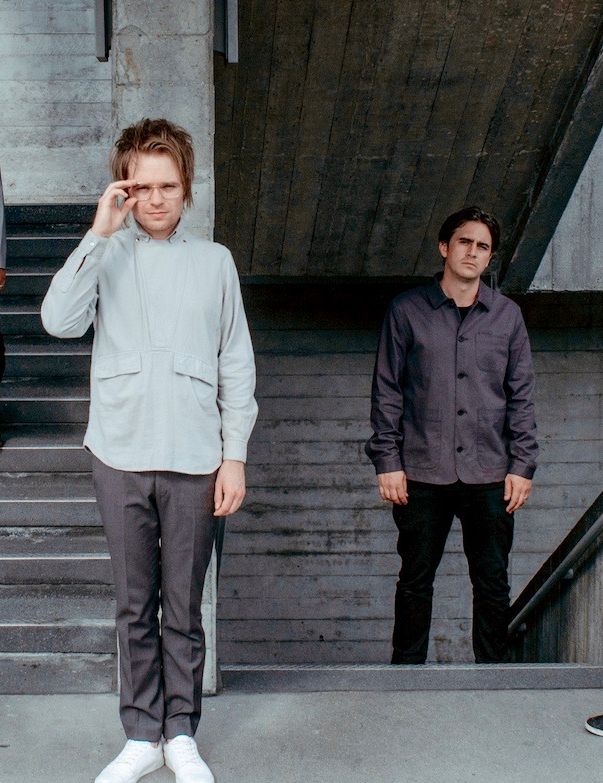Amid bouts of insomnia, anxiety, and panic attacks, plus the release of new single, Live Outside, dramatically announcing a new sonic turn for the band, Enter Shikari are standing their ground. It’s approaching 20 years since Rou Reynolds, Chris Batten, and Rob Rolfe started making music together, known then as Hybrid. They became Enter Shikari when guitarist, Rory Clewlow, joined the group. Each of their four albums has undergone a noticeable shift, but their upcoming record, The Spark, will be their biggest curveball yet.
I am sat with Rou, Rob, and Rory, a dream of alliteration, in Rob’s back garden in St Albans. He lives in the city’s conservation area, full of quaint Tudor houses and ancient pubs. With the exception of London-based Rou, the band have chosen to remain in their hometown. Presumably, St Albans offers some nice respite after the madness of touring. Rob’s adorable new Fenlander puppy, Teebie, is desperately trying to bite anything and everything, including my backpack.
We start with the obvious: the band’s Black Mirror-inspired video for lead single, Live Outside, which is somehow equal parts Orwellian nightmare and hilarious satire.
“Bob Gallagher, who directed the video, is such a lovely, soft spoken guy,” Rou tells me, looking sharp in a white shirt, Lennon-style glasses, and his overflowing, undercut hairstyle. “But he has such a dark sense of humour! In that last shot, which is so grim, I just remember him giggling behind the camera [laughs].”
I mention that I found the video felt political, whereas the lyrics of the song feel much more personal.
“That’s right,” Rob confirms. “We do like to sometimes do a video which doesn’t necessarily match up with the lyrics entirely.”
“These lyrics are open to different interpretations,” adds Rou. “It definitely works politically, but the initial idea behind them was mental health stuff. But the two play hand in hand so much; the video is reflecting the monotony of capitalism and the entertainment industry. Obviously mental health is intertwined and affected by those things, as well.”
Despite Live Outside’s black-hearted video, and touching on Rou’s recent personal troubles, it’s possibly the most uplifting track from the Shikari oeuvre yet — delightful yet ponderous pop that blends clean guitars, ‘80s synths, and a catchy chorus that will stay with you for weeks on end. The bone crunching riffs and Rou’s deathly bellows are gone, at least on The Spark’s first single.
So while every Enter Shikari album until now has possessed a new sound, it would still be a variation on a theme, with the theme primarily being alternative metal.
The music heard in Live Outside is a new theme entirely. I wonder what brought this about; a new set of influences? Growing older and maturing as people? Or the desire for artistic growth, perhaps?
“It’s not even a desire, it’s a need,” Rou insists. “The need to keep doing new things, and pushing myself. I’m quite fidgety as a musician, I get bored too easily. That’s played a part on all of our albums. But for this one, it really feels like our post-punk moment. I’ve become disillusioned with punk and metal. There really isn’t much progression there — there are so many tours we’ve done with bands who sound exactly the same, and it’s so uninspiring! Intensity isn’t just achieved by shouting; there’s so much intensity in different types of singing and music. That’s what we’ve been exploring on this record.”
And thankfully for the morale of the good ship Shikari, it’s a shared sentiment.
“We are sick and tired of it,” says Rory, known to friends and fans as Rory C. “After playing Warped Tour quite a few times, watching some of the bands really is like watching the same band, but with different people in it. The chuggy guitar tone, the sing-y chorus, and the screamy verse. We just want to get as far away from that scene as possible. Changing up our sound is for our own sanity! And when Rou presented us with Live Outside in particular, I told him, ‘you’ve nailed it!’”
A SOUND DECISION
Shikari’s fresh new approach is quite the departure from the electronicore machine fans will have become accustomed to.
“I’ve built up a lot of confidence over the last few years, in terms of being a singer and a songwriter,” Rou explains. “So I really wanted to push out of our niche, out of the ghetto of rock! And to write music that’s up there with the lineage of influences that we have.”
I ask who in particular that was for this album.
“It’ll be no surprise that the ‘80s British synth-pop scene has been a big influence,” Rob explains. “Gary Numan, Depeche Mode, The Human League. But also modern bands like Everything, Everything.”
“Also, stuff like The Stone Roses, and Britpop,” Rou adds. “That’s the best pop music for me, when punk goes into that realm. I just don’t want us to be in this box of, ‘a noisy band’ or, ‘a crazy band’. Because actually, we write fucking good tunes! Hopefully the mainstream will stop ghettoising bands like us.”
Of course, there’s also the fact that Enter Shikari have always been a band with a message. So releasing more accessible, melodic music can only help that. There was, however, a tweet by Rou saying ‘narcissistic pop, we’re coming for you... our next album will bring our message to the masses.’ Which gave the impression he didn’t want to be writing poppier music, only he was willing to reach more people.
“No, I write the music I love and enjoy,” he reassures me. “I’m the biggest fan of this band! Even though we are living in a time with amazing, forward thinking pop music, it’s still being infiltrated by the Hollywood mindset.”
Which leads us onto Taylor Swift, who Rou has been pretty vocal about on his Twitter account.
“The most recent example of this is the Taylor Swift Ticketmaster thing,” he says, with disdain. “Where you have to buy merch, and the album, to go up in the queue to get a concert ticket.”
But isn’t that to knock out ticket touts?
“I just think it’s straight exploitation. She’s only replacing the touts — she isn’t literally hiking the ticket price, but she’s making people buy merch, and her CD, just for a chance for a ticket for her show. There’s a lot of ways pop music will happily increase the pedestal, and the divide between the audience and the artist. That’s something we’ve never been about, and I still think there’s a need for those with a punk mindset to come after the pop sound, which is what I meant by that tweet!”

